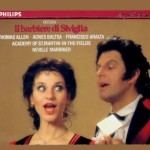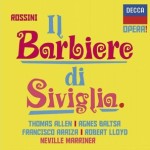Il Barbiere di Siviglia
1983, Philips/Decca
(Thomas Allen, Agnes Baltsa, Francisco Araiza, Domenico Trimarchi, Robert Lloyd, Sally Burgess; Ambrosian Opera Chorus; Academy of St. Martin in the Fields, cond. Neville Marriner)
This rendition of Rossini’s best-loved opera has always been a particular favorite of mine. Sir Neville Marriner conducts a performance full to the brim with elegance and charm. Yes, his reading is moderately paced and restrained compared to the fizzing energy of others (more English than Italian, I suppose), but it still contains
all the joy and wit that the opera needs. Furthermore, while he makes the standard cuts to the recitatives, all the musical “numbers” are note-complete, including “Cessa di piú resistere.” And the cast is a sterling one, with outstanding voices all around and nonstop comic verve, ever so slightly hammy yet never grotesque, bringing all the characters to life.
Thomas Allen is a natural-born Figaro, warm and rich in tone, effortless in patter and vivid in characterization and humor. Even more excellent, though, is Agnes Baltsa’s dynamo of a Rosina. Her agile yet sumptuous mezzo radiates feminine charm, and even its hint of vinegar perfectly suits the character’s “viperish” cunning and iron will, which she portrays with gusto. Francisco Araiza’s Count Almaviva is her match in every way: his distinctive smoky voice is far from a typical airy Rossini tenor, but it blends bel canto virtuosity with a truly aristocratic sound, and he offers a zesty characterization, hot-blooded and never afraid to be goofy. Domenico Trimarchi’s Bartolo is solidly and handsomely sung, though his voice is a little bit light for the role and some of his patter is garbled, and full of character: funny, yet with a genuine hint of menace in his blustering. Robert Lloyd is an expertly sly, slanderous Don Basilio, his dark, gravelly bass contrasting well with Trimarchi’s more baritonal sound, and Sally Burgess’s warm-toned Berta rounds out the main ensemble well. Only Matthew Best’s Fiorello disappoints with his bland, fuzzy timbre, but his role is thankfully minor.
This Barbiere is near the very top of my list of recommendations. It’s blend of elegance, musical expertise and colorful theatrics make it a latter-day classic.






